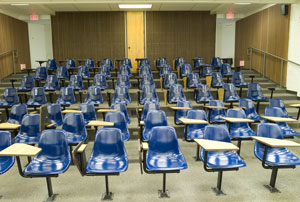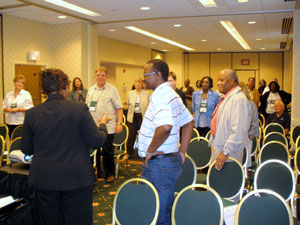Don't Hate, Mediate
Pensylvania Confict Resolution & Mediation Services, Inc.
93 Old York Road, Suite 1-427
Jenkintown, PA 19046
Phone: 215-470-0004
eMail Us

Programs for Schools - Don't Hate Mediate!
- PCRMS can design and implement training that will increase student-learning outcomes and teacher and staff effectiveness.
- PCRMS can develop measurable learning outcomes for all services and training provided.
PCRMS under Dr. Millicent Carvalho has developed a successful approach to conflict resolution, which utilizes several different approaches to conflict resolution as opposed to the boilerplate (one-size-fits-all) approach utilized by the majority of other conflict resolution practitioners.
 School-Based Programs
School-Based Programs
PCRMS’ services and training facilitate the development of socially acceptable skills and students to increase productive behavior and change maladaptive behavior by challenging the values and attitudes that influence destructive behavior. This pedagogical approach facilitates students’ development of a deeper understanding of themselves, a greater appreciation for their own lived experiences as well as an appreciation of the impact their success or failure, in school, has on the larger community.
PCRMS’ creative training engages and empowers young people to resist the adverse impact of discrimination and structural violence as it affects their development and responses to conflict. We accomplish this goal by training students to recognize feelings that can lead to conflict, and negotiate crucial choices that ultimately affect their lives. Students will develop constructive conflict resolution skills and the habit of paying attention to negative feelings, while identifying positive ways of getting their needs met.
Student Groups Served:
|
Collaboration at All Levels:PCRMS engages stakeholders at all levels of the community utilizing multicultural perspectives and outstanding communication skills and mediation tools. |
 The Cost of Conflict
The Cost of Conflict
We don't need to tell you about the cost of conflict, especially in a school setting. You can appreciate how conflict, among students, staff and faculty and parents directly and indirectly, can affect student-learning outcomes. Conflict cost money, hinders good thinking and hurts relationships. Conflict hinders learning and can take a life.
Notwithstanding a vivid spectrum of philosophies and approaches to conflict resolution has proliferated over the past twenty years, the practice of conflict resolution training for lay people (administrators, teachers, staff, students and parents, etc.) has been slow to incorporate the burgeoning renaissance of theory, especially in their applications to real-life, workplace and community situations.
One problem is that the first step some make in trying to resolve conflict is to immediately appeal to an individual’s intellect rather than the emotional needs that beg to be addressed. Individuals have been known to take a life because they felt disrespected. Appealing to the rational mind in these circumstances, before it can take control and restore calm is a waste of time. PCRMS’ has been effective in empowering students to appreciate the connection between disrespect or perceived disrespect and violent crime in schools and neighborhoods.
Facilitating a safe and supportive learning community environment is a priority.
Some students lack the socialization to appreciate the value of education or the or ego strength to risk failure in order to learn something new. Integrating conflict resolution and problem solving into the curriculum provides an opportunity to reinforce cultural norms that support and validate the importance of education. Students who are performing below grade level often have little motivation to focus on their studies, especially if they have limited parental support. Student learning must involve parents at every level.
In addition to working with students, parents have to be educated about the importance of education, not only for their children’s benefit but also for themselves. Parents must have the educational skills necessary to reinforce classroom learning. Dr. Carvalho, PCRMS’ founder, spent 10 years at La Salle University providing adult and family literacy programs, GED training and testing (in English and Spanish) and ESL programs (including ESL programs for students who had literacy problems in their first language). Dr. Carvalho served as Chief Examiner of the GED Testing Program at La Salle University’s Urban Studies and Community Services Center. La Salle University received the “EVE” Award from the Department of Labor, in part, for the success of the literacy and GED programs she directed.
Signature Programs:
“Why Can’t We Get Along?”™
Why Cant We Get Along? is a character education program that targets unmitigated conflict at home, on the streets and in schools. This program is individually designed to meet the needs of participants. A boilerplate approach to conflict resolution training is a hit or miss proposition. If it worked, it would be a stroke of genius. However, it is unlikely that a boilerplate approach to training will work long term, particularly considering the changing dynamics of schools and student conflict situations.
It is not uncommon for students to come from single parent homes or foster care and dysfunctional families where violence (hitting, name-calling, and profanity) are socialized behaviors as first responses to conflict. Helping students to develop peaceful ways of resolving interpersonal conflict is a priority for PCRMS. For example, in dealing with students who seem to lack basic home training (for example, saying, please, thank you, excuse me, etc), unresponsive or disrespectful parents, or irate community leaders, it isnt very helpful to focus solely on a few steps that assume that the other party in conflict has been socialized to play by the rules of common courtesy. If that were the case, there would be little conflict to resolve. The Pennsylvania Conflict Resolution and Mediation Services, Inc. (PCRMS) was founded in 2002, to address this problem.
“Don’t Hate, Mediate”™
Dont Hate, Mediate is a peer mediation and conflict resolution program that teaches children how to use mediation tools to resolve conflict practically and peacefully. The training is culturally relevant and tailored to the specific needs of participants.
Conflict is a negative feeling or experience. Yet, there are many conflict resolution programs that propose that conflict is neither good nor bad or is a natural part of human interaction. Some even argue that conflict can be good for relationships. Conflict is more than a disagreement or difference in opinion. Conflict is a negative emotional response! Even more disturbing is that most conflict resolution providers tend to be one dimensional in their approach to conflict, and narrow adherents to a specific method. A boilerplate approach to conflict resolution intervention is a hit or miss proposition. If it worked, it would be a stroke of genius. However, it is unlikely that a boilerplate approach to training will work long term, particularly considering the changing dynamics of schools and student conflict situations.
PCRMS training is culturally relevant. It emphasizes practical skills for good communication and a response to conflict that appreciates cultural differences and builds positive relationships, while discouraging violent confrontation.
Coaching, Consultation, Professional Development And Training Services
(Conflict Management Coaching for Teachers and Staff)
Conducted individually or in small groups. Participants have an opportunity to gain insight into their own conflict management styles, and gain conflict resolution skills that decrease negative responses in conflict situations and increase cooperative behaviors.
 Training For Teachers, Staff, Parents And Community Partners
Training For Teachers, Staff, Parents And Community Partners
(Conflict Resolution, Diversity and Leadership)
- Introduction to Transformational Leadership and Diversity Practice: This skill development training focuses on identifying multicultural strategies for improving the quality of working relationships among teachers and staff and within teacher-student relationships.
- Conflict Advising: “Why Can’t We Get Along?” This skill development training focuses on enhancing performance outcomes and providing skill development in conflict management and student relations.
- Interpersonal Communication and Anchoring Biases in the Workplace: This skill development training assists participants in conflict situations to enhance their cultural competency skills with sensitivity to differences in perception of “the problem.” Special emphasis is on race, ethnicity and class issues, values, and different methods of relating in different cultures. If left unchecked, biases can hinder effective service delivery.
- Active Listening Techniques for “Getting to Yes: This training focuses on practical training in active listening that support interpersonal communication. Training includes the use of negotiation as an advocacy tool in gaining trust and “negotiating agreements.”
- Managing Anger and Interpersonal Communication: This skill development training focuses on increasing capacity in understanding the feelings and emotions behind anger. Participants will have an opportunity to gain insight into the issues that cause impulsive violence and practical strategies and techniques that can deescalate a violent situation quickly.
- Repairing Damaged Relationships: This advanced training offers resources in restorative processes that address grievances, harassment, victim-offender issues, and community conflicts. Participants exit the training with a deeper understanding of how to repair relationships damaged by conflict and manage conflict before lawyers become involved.
- Getting to Yes: Overview of Conflict Handling Models: There are many models of conflict resolution. Which model do you use? This advanced training provides an overview of the various mediation and conflict transformation models of resolving conflict, including facilitative mediation, transformative mediation and conferencing. Each model has optimal effectiveness but under different conditions. Participants get an in-depth overview of three popular conflict handling models allowing them to determine if they want to gain further training as a conflict resolution specialist.
Change Management Training
- Positive Change for Teachers
Increasingly, teachers are being expected to produce changes in student learning outcomes, and solve cross-system problems that limit available resources and exert influence with parents to benefit at-risk students, within a short amount of time. Despite problems obtaining cooperation from parents and or collateral parties involved in educational activities, teachers must meet or exceed performance standards. Attention will be given to understanding why African Americans and Latinos are disproportionately over-represented in entitlement programs. In addition, evidenced-based strategies and techniques for addressing the problem will be discussed.
- Ethical Judgment and Decision Making
This hands-on training is specifically designed to assist educators with ethical decision-making by reinforcing practical and realistic problem-solving strategies that improve worker efficacy and student learning outcomes.
Contact us to discuss your specific needs at 215-470-0004.
Additionally, we produce educational podcasts that show people how to deal with unmitigated conflict in the home, on the streets, in schools and around the world. Visit the Radio Show Website Featuring Dr. Carvalho:
Why Can't We Get Along Radio Show
